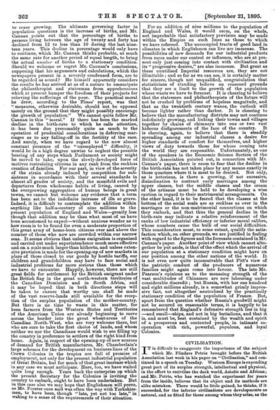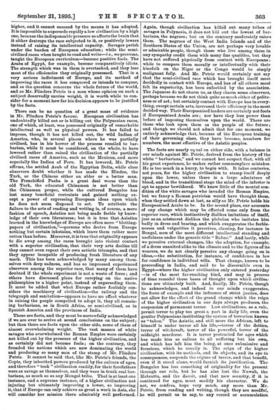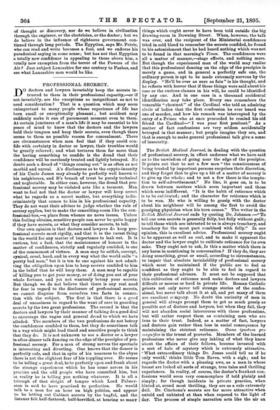CIVILISATION.
JT is difficult to exaggerate the importance of the subject which Mr. Flinders Petrie brought before the British Association last week in his paper on "Civilisation," and con- tinued in a speech on Tuesday. Western Europe is expending great part of its surplus strength, intellectual and physical, in the effort to re,civilise the dark world, Asiatic and African; and Mr. Petrie, who has watched the experiment for years from the inside, believes that its object and its methods are alike mistaken. There would be little gained, he thinks, if it succeeded, for the inferior civilisations are developments as natural, and as fitted for those among whom they arise, as the higher, and it cannot succeed by the means it has adopted. It is impossible to supersede rapidly a low civilisation by a high one, because the indispensable pressure so affects the brain that it either destroys the race subjected to it, or positively lowers instead of raising its intellectual capacity. Savages perish under the burden of European education; while the semi- civilised races when taught to read and write—i.e., we presume, taught the European curriculum—become positive fools. The Arabs of Egypt, for example, become comparatively idiots. The strength which was in them is overtasked, and they lose most of the efficiencies they originally possessed. That is a very serious indictment of Europe, and its method of improving the races it has conquered or intends to conquer, and as the question concerns the whole future of the world, and as Mr. Flinders Petrie is a man whose opinion on such a subject deservedly carries weight, it is worth while to con- sider for a moment how far his decision appears to be justified by the facts.
There can be no question of a great mass of evidence in Mr. Flinders Petrie's favour. European civilisation has undoubtedly killed out or is killing out the Polynesian races, one of which, at least, was possessed originally of remarkable intellectual as well as physical powers. It has failed to impress, though it has not killed out, the wild Indian of America, who, in several places where he was partially civilised, has in his horror of the process recoiled to bar- barism, while it must be considered, on the whole, to have lowered rather than raised the civilisation of the partially civilised races of America, such as the Mexican, and more especially the Indian of Peru. It has lowered, Mr. Petrie affirms, the settled Arab of the Egyptian Delta, while close observers doubt whether it has made the Hindoo, the Turk, or the Chinese either an abler or a better man. The Frenchified Pasha is a great deal worse than the old Turk, the educated Chinaman is not better than the Chinaman proper, while the cultured Bengalee has lost many beneficial restraints and gained nothing ex- cept a power of expressing European ideas upon which he does not seem disposed to act. To attribute the failure to the arts of reading and writing is, of course, a mere fashion of speech, Asiatics not being made feeble by know- ledge of their own literatures; but it is true that Asiatics learned in the knowledge of Europe are often mere "blotting- papers of civilisation,"—persons who derive from Europe nothing but certain inkstains, which leave them rather more rotten than before. Moreover, it is true that originality appears to die away among the races brought into violent contact with a superior civilisation, that their very arts decline till they cannot even repeat their own artistic triumphs, and that they appear incapable of producing fresh literature of any mark. This has been acknowledged by many among them- selves with deep sadness, and has so impressed experienced observers among the superior race, that many of them have doubted if the whole experiment is not a waste of force ; and others have discussed plans for carrying on the native philosophies to a higher point, instead of superseding them. It must be added that what Europe rather foolishly con- siders the machinery of civilisation—the railway and the telegraph and sanitation—appears to have no effect whatever in raising the people compelled to adopt it, they all remain- ing barbarians, as in South Africa, or semi-civilised, as in Spanish America and the provinces of India.
Those are facts, and they must be sorrowfully acknowledged if we are ever to arrive at sound conclusions on the subject; but then there are facts upon the other side, some of them of almost overwhelming weight. The vast masses of white savages who overwhelmed the Roman Empire were certainly not killed out by the pressure of the higher civilisation, and as certainly did not become fools ; on the contrary, they founded the nations which are now dominating the world and producing so many men of the stamp of Mr. Flinders Petrie. It cannot be said that, like Mr. Petrie's friends, the Copts, they inherited powers produced by the culture of ages, and therefore " took " civilisation readily, for their forefathers were as savage as themselves, and they were in truth real bar- barians, as much so as any Mongol tribe. That is at least one instance, and a supreme instance, of a higher civilisation not injuring but ultimately improving a lower, so improving it, that if Europe can only achieve as great a work in Asia, she will consider her mission there admirably well performed.
Again, though civilisation has killed out many tribes of savages in Polynesia, it does not kill out the lowest of bar- barians, the negroes ; but on the contrary moderately raises them. The negroes of the West India Islands and of the Southern States of the -Union, are not perhaps very lovable or admirable people, though those who live among them in any sympathy credit them with many fine qualities, but they have not suffered physically from contact with Europeans ; while to compare them morally or intellectually with their kinsfolk on the Niger or the Congo would be simply malignant folly. And Mr. Petrie would certainly not say that the semi-civilised race which has brought itself most decidedly in contact with Europe, and has of all others most felt its superiority, has been enfeebled by the association. The Japanese do not charm us, as they charm some observers, perhaps because we do not think quite so much either of polite- ness or of art ; but certainly contact with Europe has in every- thing, except certain arts, increased their efficiency in the most decided way. Their Europeanised leaders are certainly not fools if Europeanised Arabs are ; nor have they less power than before of imposing themselves upon the world. There are those who look upon them as the people of the future ; and though we should not admit that for one moment, we entirely acknowledge that, because of the European training of their governing class, they have become, numbers for numbers, the most effective of the Asiatic peoples.
The facts are nearly equal on either side, with a balance in our minds against Mr. Petrie, derived from the history of the white "barbarians," and we cannot but suspect that, with all his great experience, he makes rather commonplace mistakes. He is too much in a hurry, to begin with. It takes centuries, not years, for the higher civilisation to stamp itself deeply upon the lower, unless there is a large admixture of blood, and in the transitional stage the mind of the inferior is apt to appear bewildered. We know little of the mental con- dition of the white savages who invaded the Roman Empire, but we fancy a Roman patrician would have thought them, when they settled down at last, as silly as Mr. Petrie holds his Europeanised Arabs to be. In the second place, our accounts of any change which may be effected come only from the superior race, which instinctively dislikes imitations of itself, just as an aristocrat dislikes the plebeian who imitates him badly in dress and bearing, and which exaggerates the feeble- nesses and vulgarities it perceives, classing, for instance in Bengal, men of the most different intellectual standing and usefulness under the generic title " Baboo." And lastly, while we perceive external changes, like the adoption, for example, of a dress unsuited alike to the climate and to the figures of its wearers, we do not clearly perceive any change going on in ideas,—the substitution, for instance, of confidence in law for confidence in individual wills. That change, known to be proceeding in India, and said to be discernible even in Egypt—where the higher civilisation only entered yesterday —is of the most far-reaching kind, and may in process of time remodel those bases of thought upon which civilisa- tions are ultimately built. And, finally, Mr. Petrie, though he acknowledges, and indeed to our minds exaggerates, the force of example and the influence of strict justice, does not allow for the effect of the grand change which the reign of the higher civilisation in our days always produces, the suspension of permanent terror. Low civilisations, as a rule, permit terror to play too great a part in daily life, even the gentler Polynesians instituting the system of terrorism known as "taboo." The Asiatic, and still more the African, left to himself is under terror all his life,—terror of the deities, terror of witchcraft, terror of the powerful, terror of the midnight murderer. It is terror protracted for ages which has made him so callous to all suffering but his own, and which has left him the being, at once submissive and ferocious, which he usually is. The reign of the higher civilisation, with its methods, and its objects, and its eye to consequences, suspends the regime of terror, and that benefit, even if it stood alone, would furnish its justification. The Bengalee has lost something of originality for the present through our rule, but he has also lost the Nuwab, the Mahratta, and the dacoit, and that new security, if it is continued for ages, must modify his character. We do not, we confess, hope very much, any more than Mr. Petrie, from reading and writing, though they are needful, he will permit us to say, to any record or accumulation of thought or discovery, nor do we believe in civilisation through the engineer, or the electrician, or the doctor ; but we do believe in the influence of righteous government con- tinued through long periods. The Egyptian, says Mr. Petrie, who can read and write becomes a fool, and we endorse his paradoxical saying in some sense; but has not that Egyptian a totally new confidence in appealing to those above him, a totally new exemption from the terror of the Powers of the Air P Just subject Lancashire for one century to Pashas, and see what Lancashire men would be like.




































 Previous page
Previous page